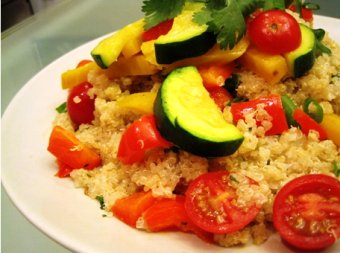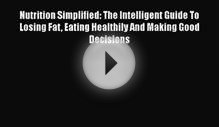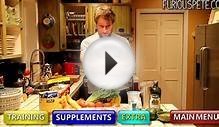
 We all know that vegan foods are far healthier than animal products. They’re cholesterol-free, and they’re more likely to be low in saturated fat and calories and high in fiber, complex carbohydrates, and cancer-fighting antioxidants. Of course, I’m not talking vegan cookies, candy or potato chips. If you want to reap the health benefits of a vegan diet—a slim waistline, normal blood pressure, lots of energy, and a reduced risk of developing heart disease, diabetes, and certain types of cancer—you should eat an array of fruits, veggies, beans, whole grains, and other wholesome plant-based foods. Big surprise, huh?
We all know that vegan foods are far healthier than animal products. They’re cholesterol-free, and they’re more likely to be low in saturated fat and calories and high in fiber, complex carbohydrates, and cancer-fighting antioxidants. Of course, I’m not talking vegan cookies, candy or potato chips. If you want to reap the health benefits of a vegan diet—a slim waistline, normal blood pressure, lots of energy, and a reduced risk of developing heart disease, diabetes, and certain types of cancer—you should eat an array of fruits, veggies, beans, whole grains, and other wholesome plant-based foods. Big surprise, huh?
If you’re a vegan, everyone from your third cousin to your third-grade teacher has likely quizzed you about where you get your nutrients. They don’t need to worry. Plant-based foods can provide for all of your nutritional needs:
Protein-Packed Plant Foods Almost every food contains protein, so it’s nearly impossible not to get enough if you’re consuming an adequate amount of calories. Soybeans, a vegan super-food, are packed with protein and essential amino acids. Other beans as well as chickpeas, lentils, nuts, seeds, mushrooms, broccoli, walnuts, whole-wheat bread, oatmeal, and corn are also good protein sources.
Calcium Plus Compassion Cows don’t have to suffer in order for people to get calcium. It’s abundant in collard greens, kale, broccoli, beans, sesame tahini, and almonds. It can also be found in calcium-fortified soy or rice milk, orange juice, and some brands of tofu.
Fish-Free Omega-3s Omega-3 fatty acids are essential for heart, brain, skin, and joint health. Fortunately, you can get them without all the cholesterol and toxins found in fish. Flaxseeds, walnuts, and canola oil are good vegan sources of the omega-3 ALA. It’s also a good idea to take vegan DHA capsules, which contain omega-3s derived from algae (where the fish get it from!).
Make Popeye Proud Spinach is rich in iron, so eat it heartily. Other iron-rich foods include beans, black-eyed peas, lentils, chickpeas, oatmeal, dried fruits, nuts, sunflower seeds, nutritional yeast, molasses, and grains such as quinoa and millet. Vitamin C helps increase iron absorption, so for optimal health benefits, consume foods that are rich in both nutrients, such as dark-green, leafy vegetables. (Some springtime favorites fit this bill nicely. Check out our Vegetarian Living page for information on healthy seasonal fare.)
INTERESTING VIDEO












